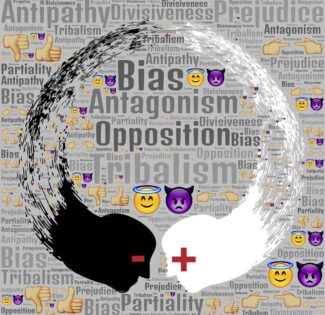It is difficult to escape the feeling that our world is becoming more divided by the day. For example, we are hearing more about political identity. While it has been quite customary to identify with some political party in terms of general policy, the term has now developed a sharper edge. Amy Chua writing in The Guardian newspaper notes:
“When groups feel threatened, they retreat into Tribalism. When groups feel mistreated and disrespected, they close ranks and become more insular, more defensive, more punitive, more of us-versus-them. In America today, every group feels this way to some extent. Whites and blacks, Latinos and Asians, men and women, Christians, Jews, and Muslims, straight people and gay people, liberals and conservatives – all feel their groups are being attacked, bullied, persecuted, discriminated against. Once identity politics gains momentum, it inevitably subdivides, giving rise to ever-proliferating group identities demanding recognition.”
Christ warned us that at the time of the end, love would grow cold. He also acknowledged the need for the Church to grow in love. “Beloved, let us love one another, for love is of God; and everyone who loves is born of God and knows God. He who does not love does not know God, for God is love” (1 John 4:7-8). There is not a lot of wriggle room here. The Apostle Paul declared that without love we are nothing.
Since God is love, His love emanates from Him. It is a dominant fruit of God’s Spirit, and we are encouraged to walk in the Spirit. This walk is something we must will to do. We choose to sacrifice our own desires in subjection to the will of God.
Loving our fellow man is something we must will to do. It is more than a sentiment or emotion. We must use our will to make deliberate choices in regard to other people including those for whom we may have no natural affection. “Beloved, if God so loved us, we also ought to love one another” (1 John 4:11).
Those choices we must make are outlined clearly by Paul in 1 Corinthians 13. This chapter is often referred to as the love chapter, as it explains the actions we need to take in order to demonstrate love:
“Though I speak with the tongues of men and of angels, but have not love, I have become sounding brass or a clanging cymbal. 2 And though I have the gift of prophecy, and understand all mysteries and all knowledge, and though I have all faith, so that I could remove mountains, but have not love, I am nothing. 3 And though I bestow all my goods to feed the poor, and though I give my body to be burned, but have not love, it profits me nothing. 4 Love suffers long and is kind; love does not envy; love does not parade itself, is not puffed up; 5 does not behave rudely, does not seek its own, is not provoked, thinks no evil; 6 does not rejoice in iniquity, but rejoices in the truth; 7 bears all things, believes all things, hopes all things, endures all things. 8 Love never fails. But whether there are prophecies, they will fail; whether there are tongues, they will cease; whether there is knowledge, it will vanish away. 9 For we know in part and we prophesy in part. 10 But when that which is perfect has come, then that which is in part will be done away. 11 When I was a child, I spoke as a child, I understood as a child, I thought as a child; but when I became a man, I put away childish things. 12 For now we see in a mirror, dimly, but then face to face. Now I know in part, but then I shall know just as I also am known. 13 And now abide faith, hope, love, these three; but the greatest of these is love” (1 Corinthians 13:1–13 NKJV).
We would all do well to take some time to review in detail the attributes set out in 1 Corinthians 13 as they are expressions of godly love. The pressure of “identity politics” is growing and is becoming all-pervasive. Godly love can and will help us resist the growing divisions within our society.
Brian Orchard


